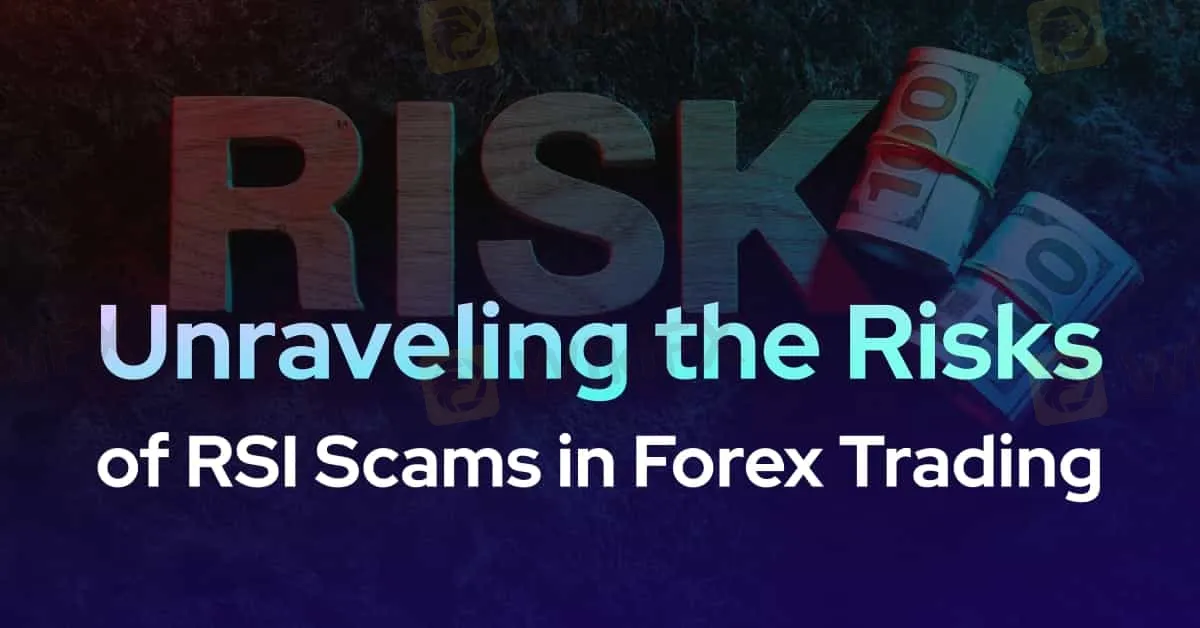简体中文
繁體中文
English
Pусский
日本語
ภาษาไทย
Tiếng Việt
Bahasa Indonesia
Español
हिन्दी
Filippiiniläinen
Français
Deutsch
Português
Türkçe
한국어
العربية
Unraveling the Risks of RSI Scams in Forex Trading
Abstract:The forex market, with its complexities and rapid fluctuations, attracts traders seeking effective tools to gauge market momentum. The Relative Strength Index (RSI), a popular momentum oscillator, is widely used for this purpose. However, amidst the legitimate applications of RSI, there is a growing concern about scams that exploit this indicator for deceptive practices.

The forex market, with its complexities and rapid fluctuations, attracts traders seeking effective tools to gauge market momentum. The Relative Strength Index (RSI), a popular momentum oscillator, is widely used for this purpose. However, amidst the legitimate applications of RSI, there is a growing concern about scams that exploit this indicator for deceptive practices.
Understanding the Role of RSI in Forex Trading:
The Relative Strength Index (RSI) is a momentum oscillator that measures the speed and change of price movements. Traders often use it to identify overbought and oversold conditions in the market, helping them anticipate potential trend reversals. While RSI is a valuable tool, scammers have found ways to misuse it, leading to deceptive practices that can harm unsuspecting traders.
Fake Signals and Misleading Readings:
One common tactic employed by fraudulent entities is the generation of fake signals using RSI. Scammers might manipulate RSI settings to produce artificial overbought or oversold readings, leading traders to make decisions based on false signals. This can result in significant financial losses for traders who rely solely on these manipulated RSI readings.
Exaggerated Success Rates:
Scammers often present exaggerated success rates associated with RSI-based trading strategies. They may claim to have discovered foolproof methods for consistently profiting from the market by interpreting RSI readings. Traders should approach such claims with skepticism, as consistently predicting market movements with such precision is challenging and may indicate deceptive practices.
Unregulated RSI-Based Trading Systems:
Fraudulent actors may promote unregulated RSI-based trading systems, claiming that these systems hold the key to guaranteed profits. Traders should exercise caution when considering such systems, as unregulated entities may lack transparency and oversight, posing a higher risk of engaging in deceptive practices.
Protecting Yourself from RSI Scams:
To safeguard against falling victim to RSI scams, traders should adopt a cautious and informed approach. Here are some key steps to protect yourself:
Educate Yourself:
Gain a thorough understanding of how RSI works and its applications in different market conditions. This knowledge will enable you to discern legitimate signals from potential scams.
Verify Performance in Real-Time:
Before committing to any RSI-based trading system, independently verify its performance in real-time market conditions. Be skeptical of systems that rely solely on historical data without transparent, ongoing results.
Diversify Analysis Techniques:
Avoid relying solely on RSI for trading decisions. Combine the use of RSI with other technical indicators and fundamental analysis to gain a more comprehensive view of the market.
WikiFX: Your Shield Against Deceptive Forex Practices
WikiFX, a prominent forex broker information and rating platform, stands as a reliable resource for traders seeking information about brokers, trading strategies, and indicators. The platform's commitment to transparency aligns with the goal of creating a safer and more secure trading environment for all participants.
By utilizing WikiFX's services, traders can access comprehensive information about brokers, including their regulatory status, customer reviews, and ratings. Armed with this knowledge, traders can make more informed decisions and protect themselves from falling prey to RSI scams and other deceptive practices.
In conclusion, while the RSI is a valuable tool in forex trading, traders must remain vigilant against scams that exploit this indicator. By staying informed, verifying performance, and leveraging resources like WikiFX, traders can protect themselves from deceptive practices and navigate the forex market with greater confidence.

Disclaimer:
The views in this article only represent the author's personal views, and do not constitute investment advice on this platform. This platform does not guarantee the accuracy, completeness and timeliness of the information in the article, and will not be liable for any loss caused by the use of or reliance on the information in the article.
Read more

WikiFX Review: Is IVY Markets Reliable?
IVY Markets, established in 2018, positions itself as a global brokerage offering a diverse range of trading instruments, including Forex, Commodities, Cryptocurrencies, and Stocks. The platform provides two primary account types—Standard and PRO—with a minimum deposit requirement of $50 and leverage up to 1:400.

Germany's Election: Immigration, Economy & Political Tensions Take Centre Stage
Germany is set to hold a crucial general election on 23 February 2025, with voter frustration over migration emerging as a dominant issue.

XTB Secures Chilean License, Expands Latin America Footprint
XTB gains a securities agent license in Chile, boosting its Latin America presence. The broker plans to offer stocks, ETFs, and derivatives to local investors.

Deepfake Deception: New Face of Financial Scams in Forex and Crypto
In the ever-evolving landscape of financial scams, fraudsters are now leveraging cutting-edge artificial intelligence (AI) to deceive unsuspecting victims. Deepfake technology, which manipulates audio and video to create hyper-realistic but entirely fabricated content, has become a powerful tool for scammers, particularly in the forex and cryptocurrency markets.
WikiFX Broker
Latest News
Why Do You Keep Blowing Accounts or Making Losses?
eToro Adds ADX Stocks to Platform for Global Investors
B2BROKER Launches PrimeXM XCore Support for Brokers
Germany's Election: Immigration, Economy & Political Tensions Take Centre Stage
WikiFX Review: Is IVY Markets Reliable?
Checkout FCA Warning List of 21 FEB 2025
Google Bitcoin Integration: A Game-Changer or Risky Move?
IG 2025 Most Comprehensive Review
Why Should Women Join FX Market?
ED Exposed US Warned Crypto Scam ”Bit Connect”
Currency Calculator






